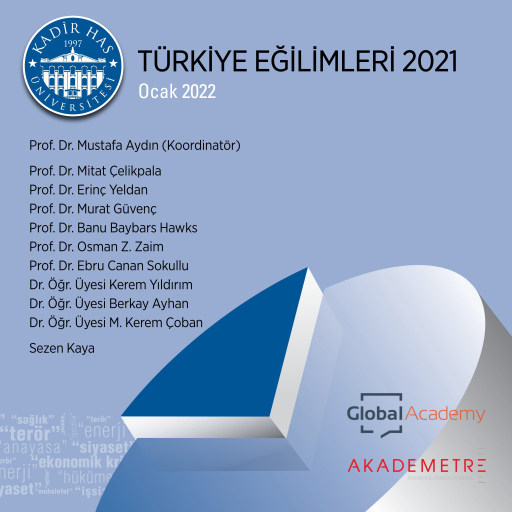Turkey Trends Survey 2021 Results Announced
4 January 2022Overwhelmed by economic troubles, Turks relegate the COVID-19 and the refugees into secondary place
The results of the “Turkey Trends” survey, keeping the pulse of Turkey for 11 years, are announced. Representative of Turkey’s demographics, this survey, conducted by an academic team coordinated by Prof. Dr. Mustafa Aydın, is based on interviews with 1,000 people over the age of 18 living in 26 provinces. According to the study, the main concern of the Turkish public is “economic problems”. The “refugee issue”, which tripled its percentage compared to last year, took the second place, followed by the “Coronavirus pandemic” in the third place.
The 2021 field study of the “Turkey Trends” Survey, developed in partnership with Kadir Has University’s Turkey Research Group and Global Academy, were carried out by Akademetre Research and Strategic Planning between October 23 and November 5, 2021.
Participants of the survey comprised of 1,000 people over the age of 18 residing in city centers in 26 provinces (Istanbul, Ankara, Konya, Bursa, Kocaeli, İzmir, Aydın, Manisa, Tekirdağ, Balıkesir, Adana, Antalya, Hatay, Zonguldak, Samsun, Kastamonu, Kayseri, Kırıkkale, Trabzon, Gaziantep, Diyarbakır, Mardin, Malatya, Bitlis, Erzurum and Ağrı).
The results of the “Turkey Trends 2021” research were presented in a meeting on Tuesday, January 4, 2022, with the participation of the research team members, i.e., Prof. Dr. Mustafa Aydın, Prof. Dr. Mitat Çelikpala, Prof. Dr. Erinç Yeldan, Prof. Dr. Murat Güvenç, Prof. Dr. Osman Z. Zaim, Prof. Dr. Banu Baybars Hawks, Asst. Prof. Kerem Yıldırım, Asst. Prof. Berkay Ayhan, Asst. Prof. M. Kerem Çoban and Sezen Kaya.
The Turkey Trends survey provides a very valuable resource to understand and follow Turkey’s transformation with the data it has collected for 11 years. Kadir Has University Faculty Member and Global Academy General Coordinator Prof. Dr. Mustafa Aydın stated, “With this study, Turkey’s social, economic, political and cultural changes and people’s living habits are measured objectively; thus, it becomes possible to monitor and predict Turkey’s social change. As Kadir Has University and Global Academy, we are very happy to carry out such research jointly.”
TURKEY’S AGENDA: ECONOMIC PROBLEMS, REFUGEES AND CORONA
According to the results of the survey, the most important issue on the minds of Turkey’s citizens appeared as “problems in the economy” with 22.7%. Concerns about “Refugees” is second, which has increased from 6% last year to 17.9% this year. The “coronavirus pandemic”, which ranked highest last year, seems to have regressed to the third most important topic with a rate of 15.8%. “Restriction of rights and freedoms” ranked fourth by dropping from 12.3% to 7.3%; the “fight against terrorism” became fifth which dropped from 8% to 7.2%. These items are followed by “education” with 0.1%.
When the results were analyzed based on geographical regions, economic problems come first in the Mediterranean and Central Anatolia regions, while the refugee issue is prioritized in Eastern and Southeastern Anatolia, the coronavirus epidemic ranks the top in Marmara and the Aegean, and terrorism comes first in the Black Sea region.
THE RATIO OF PEOPLE EXPERIENCING LIVING DIFFICULTIES IS INCREASING
When compared with the survey results of the last year, the rate of those citizens who say “I cannot support myself/my family economically” increased from 51.1% to 57.2%. The percentage of people who state “I am in a worse situation economically” increased from 51.8% to 55.4%. However, the rate of those respondents who think that their income is sufficient to meet their monthly consumption expenditures increased from 33.4% to 40%.
Looking at the main causes of recent economic difficulties in Turkey from the perspective of the participants, “high interest rates” (20.7%), “high foreign borrowing” (14.8%) and “immigrants and refugees” (14.4%) take the first three slots.
Among the issues seen as important regarding Turkey’s economy, high interest rates (85.6%), high inflation (84.7%), increase in food prices (82.3%), depreciation of the Turkish lira (81.9%), increases in house prices/renting (80.4%), unemployment (79.6%), high tax rates (79.3%), problems in foreign policy (79.1%), high foreign debts (78.9%) and inequalities in income distribution (78,7%) draw attention.
While only 5.4% of Turkish people stated that “They have the opportunity to make savings after meeting their monthly needs”, as means of savings “I buy gold” (54.6%) and “I buy foreign currency” (38%) were determined as the most preferred options by far. On the other hand, those who said “I put it in an interest account as TL” remained at 14.5%, and those who say “I invest in the stock market” remained at 10.3%.
THE PLACE OF THE TURKISH PEOPLE IN THE POLITICAL SPECTRUM
In order to determine the place of the Turkish people in the political spectrum, the survey asked, “How would you describe yourself in terms of your political view?” The most common responses were “Conservative” (27.5%), followed by “Nationalist” (19.9%) and “Kemalist” (19.2%), which increased from 10.3%. While the rate of those participants who define themselves as “Political Islamist” (9%) did not show a significant change compared to the previous year, the rate of those who say “Social Democrat” decreased from 13.9% to 8.3%.
Citizens who define themselves as “Conservative” or “Political Islamist” are found highest among the ages between 41-55, whereas those who define themselves as “Nationalist” or “Kemalist” are found highest among the ages between 18-20.
The survey also tracks the change over the years in the percentage of people who state that they are “conservative” or “political Islamist”. The total was the highest in 2017 at 47.4%. This number steadily decreased to 34.6% in 2020. For 2021, the percentage of people who identify with being “conservative” or “political Islamist” increased slightly to 36.5%.
PREFERENCES FOR POLITICAL GOVERNANCE SYSTEM/STYLE
Regarding the governing system of Turkey, 55.7% of participants prefer the Presidential System, while 44.3% state that they prefer the Parliamentary System. These rates have not undergone a significant change when compared to the previous year.
The participants were asked to evaluate statements presented to them. 55.3% (60.8% in 2020) consider the “Rule with the democratic political system” as very good or good, while 51.2% (46.6% in 2020) consider “Having a strong leader who does not have to deal with parliament and elections” as very good or good. These are followed by those who affirm “Experts should do what they believe is best for the country instead of the government” with 38.2%, “Religious leaders should rule the country” with 28.1%, and “The army should rule the country” with 25.2%.
While 58.4% of the participants state that “teaching young people to protect the moral values of the Turkish nation is more important than giving democracy education”, 50.3% of the participants (35.5% in 2019) agreed with the statement that “Turkey is a democratic country”.
EARLY ELECTIONS AND VOTER PREFERENCES
To the question of “Is it necessary to hold the presidential and parliamentary elections earlier, which are foreseen to be held in June 2023?”, 64.5% of the respondents answered “No”. Among the cited reasons in the responses of those who deem it necessary to hold early elections (16.9%) are such “change of administration”, “economic conditions”, “bad system”, “bad general situation” and “lack of justice” appears prominent.
In the ranking of “Characteristics that an ideal President should have”, the proposition of “Must have a successful political background” rose five places to rank the first with 70%, followed by “Management experience” (68.8%), “Honest and moral” (68.7), “Having high evaluation skills” (67.9) and “Being engaged with the public” (67.5).
To the question of “If there was an election today, which party would you vote for?”, the participants answered AKP (35.9%), CHP (24.6%), MHP (9.7%), IYI Party (9.4%) and HDP (9%). The percentage of those who state that they would not vote was 5.3%, while the undecided rate remains at 3.6%.
THE POLICE TAKES THE FIRST RANK IN MOST TRUSTED INSTITUTIONS
According to the results of the research, the top three places among the most trusted institutions of the Turkish people remained with security institutions in recent years: Police rose to first place with 65.4% in 2021, followed by the Gendarmerie in second place (65.4%) and the Turkish Armed Forces in third place (62.4%). The Turkish Grand National Assembly (57%) takes fourth place, and the Presidency (56.9%) ranks fifth as the most trusted institution in Turkey.
The Turkish Medical Association, which was measured for the first time in 2020, ranked sixth (56.7%) this year. The trust in institutions such as the National Intelligence Organization, the Constitutional Court, the Union of Chambers of Turkish Engineers and Architects, the Turkish Statistical Institute, the Presidency of Religious Affairs and Bar Associations slightly increased compared to last year.
THE GOVERNMENT’S FOREIGN POLICY SCORECARD
The rate of perceiving the government’s foreign policy successful was recorded as 28.5% in 2019 and 46.5% in 2020. This year, the slight increase continues, as 50.6% of the respondents express that they are satisfied with the government’s foreign policy.
On the other hand, the dissatisfaction with the government’s Syria policies continues to increase. The rate of those who find the policies pursued on Syria successful was 36% in 2019, 32.1% in 2020, while it is 27.4% in the 2021 survey. The rate of those who find it unsuccessful rose from 23.6% to 38.1% this year.
In 2021, Muslim countries take first place with 17.5% among the countries that are thought Turkey should cooperate in its foreign policy. Russia recorded a significant increase, coming in second (16.4%). The Turkic Republics, which was first in the surveys from the previous two years with 24.6% and 19.5% respectively, regressed to third place with 14.1% this year. These countries are followed by the USA (14.1%), EU Countries (12.7%) and NATO Countries (10.1%).
The USA, which has remained for a long time at the first place on the list of countries perceived as a threat to Turkey by the Turkish public, falls to third place at 56.1% and gives its place to Armenia at 60.9%. Israel occupies the second most perceived threat to Turkey at 60.5% and Iraq is fourth (49.6%). Threat perception from the “Greek Administration of Southern Cyprus” is significantly increased in 2021 from 36.4% to 44.6%.
Perceptions regarding, “support for Turkey’s military presence in foreign countries” decreased to 29,1%, the lowest rate determined to date, and the “support for Turkey’s cross-border operations” also recorded its lowest rate to date with 33.7%.
PLEASE CLICK TO REVIEW THE RESEARCH IN DETAIL (PDF):
https://www.khas.edu.tr/sites/khas.edu.tr/files/inline-files/turkeytrends-web-press.pdf

